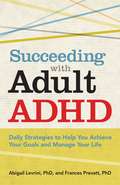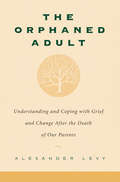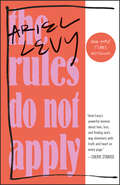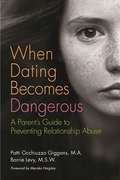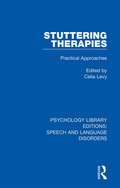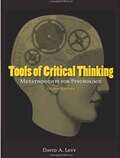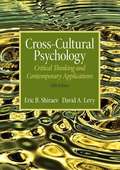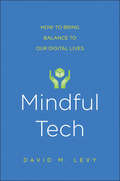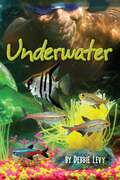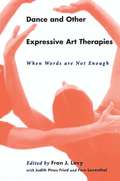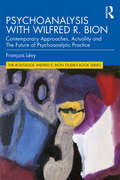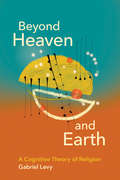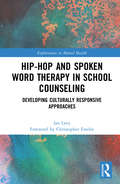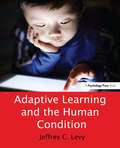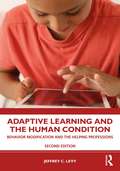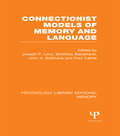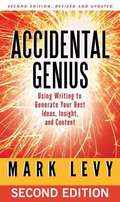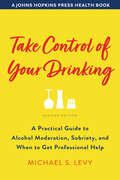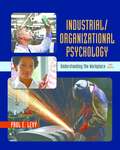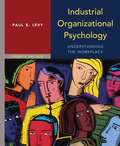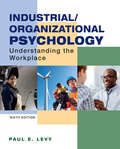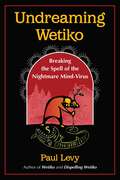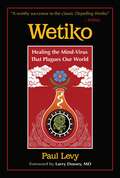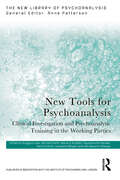- Table View
- List View
Succeeding With Adult ADHD: Daily Strategies to Help You Achieve Your Goals and Manage Your Life
by Abigail Levrini Frances PrevattIf you've been diagnosed with adult ADHD, you are well-acquainted with the procrastination, lack of motivation, and muddled time management that can thwart your best efforts to achieve. You may find yourself constantly distracted, or fear you're about to forget something important. Or you may firmly set a goal for yourself, only to abandon it later in frustration.<p><p> This book will help you overcome the challenges of adult ADHD and find fulfillment in taking the practical steps needed to achieve your goals.<p> In easy-to-master lessons, ADHD specialists Abigail Levrini and Frances Prevatt offer realistic, proven, and unique daily strategies to help you succeed with adult ADHD. Each chapter contains checklists, worksheets, and Start Reading/Stop Reading reminders to help you break down large jobs, such as organizing your space, studying effectively, or listening to your partner, into manageable tasks. You'll learn how to identify the right treatments and support for your lifestyle and find strategies for handling emotional roadblocks such as stress, anxiety, depression, and fear of failure. <p> This dynamic and interactive text will become an indispensable aid in helping you translate your goals into realities to succeed with adult ADHD.
The Orphaned Adult: Understanding and Coping with Grief and Change After the Death of Our Parents
by Alexander LevyLosing our parents when we ourselves are adults is in the natural order of things, a rite of passage into true adulthood. But whether we lose them suddenly or after a prolonged illness, and whether we were close to or estranged from them, this passage proves inevitably more difficult than we thought it would be. A much-needed and knowledgeable discussion of this adult phenomenon,The Orphaned Adult validates the wide array of disorienting emotions that can accompany the death of our parents by sharing both the author's heart-felt experience of loss and the moving stories of countless adults who have shared their losses with him. From the recognition of our own mortality and sudden child-like sorrow to a sometimes-subtle change in identity or shift of roles in the surviving family,The Orphaned Adult guides readers through the storm of change this passage brings and anchors them with its compassionate and reassuring wisdom.
The Rules Do Not Apply: A Memoir
by Ariel LevyA gorgeous memoir about a woman overcoming dramatic loss and finding reinvention—for readers of Cheryl Strayed and Joan Didion When thirty-eight-year-old New Yorker writer Ariel Levy left for a reporting trip to Mongolia in 2012, she was pregnant, married, financially secure, and successful on her own terms. A month later, none of that was true. Levy picks you up and hurls you through the story of how she built an unconventional life and then watched it fall apart with astonishing speed. Like much of her generation, she was raised to resist traditional rules—about work, about love, and about womanhood. “I wanted what we all want: everything. We want a mate who feels like family and a lover who is exotic, surprising. We want to be youthful adventurers and middle-aged mothers. We want intimacy and autonomy, safety and stimulation, reassurance and novelty, coziness and thrills. But we can’t have it all.” In this profound and beautiful memoir, Levy chronicles the adventure and heartbreak of being “a woman who is free to do whatever she chooses.” Her own story of resilience becomes an unforgettable portrait of the shifting forces in our culture, of what has changed—and of what is eternal. Advance praise for The Rules Do Not Apply“I read The Rules Do Not Apply in one long, rapt sitting. Unflinching and intimate, wrenching and revelatory, Ariel Levy’s powerful memoir about love, loss, and finding one’s way shimmers with truth and heart on every page.”—Cheryl Strayed “Every deep feeling a human is capable of will be shaken loose by this profound book. Ariel Levy has taken grief and made art out of it.”—David Sedaris “Ariel Levy is a writer of uncompromising honesty, remarkable clarity, and surprising humor gathered from the wreckage of tragedy. Her account of life doing its darnedest to topple her, and her refusal to be knocked down, will leave you shaken and inspired. I am the better for having read this book.”—Lena Dunham “A great memoir is not a trip through someone else’s life but a series of long looks into your own. Ariel Levy’s book—grieving, hopeful, painful, funny—is that.”—Amy Bloom “It’s become a truism that feminists are living out our mothers’ unlived lives. But Ariel Levy seems to be living out the unlived lives of an entire generation of women, simultaneously. Free to do whatever she chooses, she chooses everything. While reinventing work, marriage, family, pregnancy, sex, and divorce for herself from the ground up, Levy experiences devastating loss. And she recounts it all here with searing intimacy and an unsentimental yet openhearted rigor.”—Alison Bechdel “The Rules Do Not Apply is heartbreaking, brilliant, and disarming, the kind of book that may change you. Ariel Levy writes with a beauty that is ferociously honest and with the fervor of an explorer. No one else has written so insightfully about the current legacy of feminism’s ‘lavish gift’ of freedom. Levy has a voice unlike any other. This is a devastating and inspired book.”—René Steinke
When Dating Becomes Dangerous: A Parent's Guide to Preventing Relationship Abuse
by Barrie Levy Mariska Hargitay Patricia Occhiuzzo GiggansSend your teenager out into the dating world equipped with the knowledge, strength, and communication skills to walk away from abusive relationships--and to develop healthy ones.Send your teenager out into the dating world equipped with the knowledge, strength, and communication skills to walk away from relationships that are abusive--and to develop healthy ones.As our kids grow older and they start asserting their independence, we worry about their safety and well being. And when it comes to dating and intimacy, it is hard to know how to protect them when a would-be gentle relationship turns violent, be it verbally or physically. The fact is that as many as one in four high school and college-aged youth are affected by an abusive relationship. So, how do we as parents protect our kids from becoming another statistic? And how do we give them the self-assurance to leave a dangerous situation?In this informative guide for parents, Barry Levy and Patricia Occhiuzzo Giggans, both experts in relationship violence, draw on their professional experience to provide guidance for getting through the relationship challenges kids, both gay and straight, face today. Here you'll discover: How to give your teen the skills to encourage healthy relationshipsWhy many teenagers hide their abusive relationshipHow to recognize the warning signs of dating violence, including cyber abuseWhat to do if your child is the abuser, and when girls are the perpetrator of abuse
Stuttering Therapies: Practical Approaches (Psychology Library Editions: Speech and Language Disorders)
by Celia LevyOriginally published in 1987, this book presented new ideas on the treatment of stuttering, by leading authorities within Britain at the time. There are chapters on children and adolescents, as well as on adults. In each chapter the author describes the therapeutic approach, how it fits into general views on the nature of stuttering, the clients for which it is appropriate, and possible methods of evaluation. The book is aimed at speech therapists and psychologists and provided an important up-date of the subject for practitioners.
Tools Of Critical Thinking
by David A. LevyThis innovative text is designed to improve thinking skills through the application of 30 critical thinking principles—Metathoughts. These specialized tools and techniques are useful for approaching all forms of study, inquiry, and problem solving. Levy applies Metathoughts to a diverse array of issues in contemporary clinical, social, and cross-cultural psychology: identifying strengths and weaknesses in various schools of thought, defining and explaining psychological phenomena, evaluating the accuracy and usefulness of research studies, reducing logical flaws and personal biases, and improving the search for creative solutions. The Metathoughts are brought to life with practical examples, clinical vignettes, illustrations, anecdotes, thought-provoking exercises, useful antidotes, and contemporary social problems and issues. Tools of Critical Thinking, 2/E is primarily suited as a core textbook for courses in critical thinking/problem solving, or makes an ideal supplement in a wide variety of undergraduate and graduate psychology courses, including introductory psychology, abnormal psychology (psychopathology), cross-cultural psychology, theories and methods of psychotherapy, research methods and design, theories of personality, clinical practicum, and contemporary problems and issues in psychology.
Cross-Cultural Psychology: Critical Thinking and Contemporary Applications, Fifth Edition
by David A. Levy Eric B. ShiraevDynamic author team provides comprehensive overview with focus on critical-thinking. The fifth edition continues a heavy focus on applying critical thinking framework in examining, analyzing, and evaluating psychological data. With significant rewriting and additional new topics as well as updated references on new research, Cross-Cultural Psychology keeps pace with the rapidly changing conditions of modern times. The dynamic team from two different worlds bring a unique set of experiences and perceptions in writing this book. Eric Shiraev was raised in the city of Leningrad in the former Soviet Union and David Levy is from Southern California,. Between the diverse backgrounds and having each author spent an extended period teaching in the other's home country, the authors provide a comprehensive review of theories and research in cross-cultural psychology. Learning Goals Upon completing this book, readers should be able to: Better understand the field of cross-cultural psychology Understand contemporary theories and research in cross-cultural psychology Use critical thinking to examine, analyze, and evaluate the field of cross-cultural psychology Assist current and future practitioners from a wide variety of fields and services
Mindful Tech
by David M. LevyFrom email to smart phones, and from social media to Google searches, digital technologies have transformed the way we learn, entertain ourselves, socialize, and work. Despite their usefulness, these technologies have often led to information overload, stress, and distraction. In recent years many of us have begun to look at the pluses and minuses of our online lives and to ask how we might more skillfully use the tools we've developed. David M. Levy, who has lived his life between the "fast world" of high tech and the "slow world" of contemplation, offers a welcome guide to being more relaxed, attentive, and emotionally balanced, and more effective, while online. In a series of exercises carefully designed to help readers observe and reflect on their own use, Levy has readers watch themselves closely while emailing and while multitasking, and also to experiment withunplugging for a specified period. Never prescriptive, the book opens up new avenues for self-inquiry and will allow readers-in the workplace, in the classroom, and in the privacy of their homes-to make meaningful and powerful changes. "
Underwater (Exceptional Reading And Language Arts Titles For Intermediate Grades Ser.)
by Debbie LevyTwelve-year-old Gabe has ambitions to be the next Jacques Cousteau...or Bill Gates...or who? Gabe's anxiety about growing up is matched by his fear that he'll be crazy (like his brother). But he finds some relief in his underwater computer game, setting up his own aquarium, and swimming on the local team. Could it be that some things will just take care of themselves?
Narrative Development in Young Children
by Levy, Elena T. and McNeill, David Elena T. Levy David McneillAs children begin to use language in early childhood, they produce increasingly large units of coherent speech, including narrative descriptions of events. This book examines the process of narrative development in young children, focusing on the development of 'cohesion' - the use of speech and gesture to create coherent perspectives on events. Surveying early narrative development in which gesture plays an integral part, the book explores the development of cohesive, clause-linking devices during the period from age two to three. Illustrated with longitudinal cases studies, the book examines the crib-talk of two-year-old Emily and compares it to the discourse patterns of storybooks and nursery rhymes, and to her father's pre-bedtime routines. In a second case study, the authors trace the changing relationships between speech and gesture in the spontaneous narratives of two-year-old Ella. This book will be invaluable to students and researchers in language acquisition, developmental psychology and gesture studies.
Dance and Other Expressive Art Therapies: When Words Are Not Enough
by Fran J. Levy Judith Pines Fried Fern LeventhalFirst published in 1996. Routledge is an imprint of Taylor & Francis, an informa company.
Psychoanalysis with Wilfred R. Bion: Contemporary Approaches, Actuality and The Future of Psychoanalytic Practice (The Routledge Wilfred R. Bion Studies Book Series)
by François LévyPsychoanalysis with Wilfred R. Bion is the product of François Lévy’s efforts over a period of twenty years to represent clearly the classical elements and the innovatory propositions of the thought and work of Bion, who offers both new and modified ways of practising and thinking about the psychoanalytic experience. Bion’s thought, methodical and intuitive, gave rise to profound modifications in the approach to the psychology of groups, clinical work with psychoses, and the conception of the genesis of thought. Some of his original notions – psychic growth, processes of thinking, transformations, alpha function, maternal reverie – constitute valuable tools for rethinking psychoanalytic practice. This book places Bion’s thought within a filiation that is faithful to those of Sigmund Freud and Melanie Klein. It shows the parallels that exist between Bion’s formalisations and those of Lacan. It also lays emphasis on the mechanisms of thought arising from the negative (André Green), from logic (Lewis Carroll), from causalist philosophy (David Hume), from literature (Milton, Blanchot) and from the physical sciences (Stephen Hawking). Finally, Lévy underlines the importance of placing individuals within the collective from which they have originated. Psychoanalysis with Wilfred R. Bion will appeal to psychoanalysts and psychoanalytic psychotherapists looking to draw on the ideas of one of the most important and influential figures in the history of psychoanalysis.
Beyond Heaven and Earth: A Cognitive Theory of Religion
by Gabriel LevyAn approach to understanding religion that draws on both humanities and natural science but rejects approaches that employ simple monisms and radical dualisms. In Beyond Heaven and Earth, Gabriel Levy argues that collective religious narratives and beliefs are part of nature; they are the basis for the formation of the narratives and beliefs of individuals. Religion grows out of the universe, but to make sense of it we have to recognize the paradox that the universe is both mental and material (or neither). We need both humanities and natural science approaches to study religion and religious meaning, Levy contends, but we must also recognize the limits of these approaches. First, we must make the dominant metaphysics that undergird the various disciplines of science and humanities more explicit, and second, we must reject those versions of metaphysics that maintain simple monisms and radical dualisms. Bringing Donald Davidson&’s philosophy—a form of pragmatism known as anomalous monism—to bear on religion, Levy offers a blueprint for one way that the humanities and natural sciences can have a mutually respectful dialogue. Levy argues that in order to understand religions we have to take their semantic content seriously. We need to rethink such basic concepts as narrative fiction, information, agency, creativity, technology, and intimacy. In the course of his argument, Levy considers the relation between two closely related semantics, fiction and religion, and outlines a new approach to information. He then applies his theory to discrete cases: ancient texts, modern media, and intimacy.
Hip-Hop and Spoken Word Therapy in School Counseling: Developing Culturally Responsive Approaches (Explorations in Mental Health)
by Ian LevyThis volume recognizes the need for culturally responsive forms of school counseling and draws on the author’s first-hand experiences of working with students in urban schools in the United States to illustrate how hip-hop culture can be effectively integrated into school counseling to benefit and support students. Detailing the theoretical development, practical implementation and empirical evaluation of a holistic approach to school counseling dubbed "Hip-Hop and Spoken Word Therapy" (HHSWT), this volume documents the experiences of the school counsellor and students throughout a HHSWT pilot program in an urban high school. Chapters detail the socio-cultural roots of hip-hop and explain how hip-hop inspired practices such as writing lyrics, producing mix tapes and using traditional hip-hop cyphers can offer an effective means of transcending White, western approaches to counseling. The volume foregrounds the needs of racially diverse, marginalized youth, whilst also addressing the role and positioning of the school counselor in using HHSWT. Offering deep insights into the practical and conceptual challenges and benefits of this inspiring approach, this book will be a useful resource for practitioners and scholars working at the intersections of culturally responsive and relevant forms of school counseling, spoken word therapy and hip-hop studies.
Adaptive Learning and the Human Condition
by Jeffrey C. LevyAdaptive Learning and the Human Condition presents the basic principles of classical (Pavlovian) and instrumental (Skinnerian) conditioning in a more coherent and expansive manner than is the case in other textbooks. Learning is defined as an adaptive process through which individuals acquire the ability to predict, and where possible, control the environment. This overarching definition enables integration of traditional Pavlovian and Skinnerian principles and terminology and makes explicit why treatment of the learning process is essentially limited to these two historical research paradigms. Pavlov developed a methodology for studying animals under circumstances where they could predict, but not control, sequences of environmental events. Skinner studied animals under circumstances where their behavior had an effect upon environmental events. Observational learning and symbolic communication (i.e., spoken or written language) are incorporated as indirect learning processes through which individuals can acquire the ability to predict or control. This treatment creates a perspective within which it is possible to consider the fundamental nature of the learning process in understanding the human condition and in addressing significant individual and social concerns. Examples of applications and issues not included in similar textbooks include: The role of classical and instrumental conditioning in language acquisition The administration of rewards and punishers in Baumrind’s parental styles as related to Kohlberg’s stages of moral development Stone-Age hunter-gatherer and technologically-advanced cultures: How did we get from there to here? Self-control and self-actualization While covering traditional technical and theoretical issues, the book is written in a clear, engaging style. The narrative builds across chapters, culminating in the treatment of applications and societal concerns of import and interest to students and faculty alike. Upon completing this book, readers should be able to: explain the significance of human condition through adaptive learning; present the basic principles of classical and instrumental conditioning; and understand the significance of scientific research
Adaptive Learning and the Human Condition: Behavior Modification and the Helping Professions
by Jeffrey C. LevyAdaptive Learning and the Human Condition provides a coherent and comprehensive introduction to the basic principles of classical (Pavlovian) and instrumental (Skinnerian) conditioning. When combined with observational learning and language, they are responsible for human accomplishment from the Stone Age to the digital age. This edition has been thoroughly updated throughout, relating adaptive learning principles to clinical applications as well as non-traditional topics such as parenting, moral development, and the helping professions. Defining learning as an adaptive process enables students to understand the need to review the basic animal research literature in classical and operant conditioning and consider how it applies to human beings in our everyday lives. Divided into four parts, this book covers historical research into psychology and adaptive learning, principles of adaptive learning (prediction and control), adaptive learning and the human condition, and behavior modification and the helping professions. The book showcases how an adaptive learning strategy can be practical, diagnostic, and prescriptive, making this an essential companion for psychology students and those enrolled in programs in professional schools and helping professions including psychiatry, special education, health psychology, and physical therapy.
Connectionist Models of Memory and Language (Psychology Library Editions: Memory)
by Joseph P. Levy Dimitrios Bairaktaris John A. Bullinaria Paul CairnsConnectionist modelling and neural network applications had become a major sub-field of cognitive science by the mid-1990s. In this ground-breaking book, originally published in 1995, leading connectionists shed light on current approaches to memory and language modelling at the time. The book is divided into four sections: Memory; Reading; Computation and statistics; Speech and audition. Each section is introduced and set in context by the editors, allowing a wide range of language and memory issues to be addressed in one volume. This authoritative advanced level book will still be of interest for all engaged in connectionist research and the related areas of cognitive science concerned with language and memory.
Accidental Genius: Using Writing to Generate Your Best Ideas, Insights, and Content
by Mark LevyLevy shows readers how to tap into their most powerful creative thinking by using a variety of writing exercises. This second edition includes updates on how to use these exercises to generate raw material for books, articles, presentations, blog posts, and tweets.
Take Control of Your Drinking: A Practical Guide to Alcohol Moderation, Sobriety, and When to Get Professional Help (A Johns Hopkins Press Health Book)
by Michael S. LevyAccepting that there is no one-size-fits-all approach to controlling drinking, the latest edition of this bestselling book will help you assess your drinking and determine whether moderation or abstinence is the best path for you.For decades, the standard treatment for people struggling with alcohol consumption has focused on convincing them to admit that they are an alcoholic, to stop drinking entirely, and to enter into a program, most commonly Alcoholics Anonymous. But in his more than thirty-five-year career as an addiction specialist working with people who want to change their drinking habits, Michael S. Levy has found that the routes to behavioral change actually vary. And although abstinence is the successful route for many people, others can moderate their drinking on their own or with professional help. In this practical, effective, and compassionate book, Levy helps people take control of their alcohol problem by teaching them how to think about and address their drinking habits. Beginning with a set of self-assessments that reveal whether the reader's use of alcohol is creating problems, Levy explains the causes of problem drinking, discusses the growing recognition of the various ways an alcohol use disorder can show itself, and talks about why it is so difficult to change. Offering advice for choosing between moderating your drinking or abstaining altogether, he also touches on coping with slipups, fighting helplessness and the fear of failure, and knowing when moderation is not achievable. The book is unique in that instead of telling people what they need to do, it meets people at their stage of change and level of readiness to change and helps them decide for themselves what they need to do. Drawing on the latest scientific evidence, this new edition includes• a chapter on the concept of self-medication—a useful but at times overused idea;• a chapter on the concurrent use of drugs (particularly cannabis) during recovery;• an exploration of modern strategies for dealing with drinking, including technology (apps that count drinks, for example) and medications that curb alcohol consumption; • reflections on the use of stigma;• communication strategies for individuals seeking to share their struggle with others;• an exploration of common triggers;• additional worksheets and tips to achieve success; • further material about self-help programs; and • insights about the dark side of addiction treatment.Ultimately, Take Control of Your Drinking empowers people to tackle their drinking problem and gives them the freedom to do so in a way that fits with their own lifestyle and values. This book is useful for anyone who may find that they are drinking too much, for the loved ones of such people, and for clinicians who want to broaden their skills when working with people who struggle with alcohol.
Industrial/Organizational Psychology: Understanding the Workplace
by Paul LevyWritten by a leading researcher in one of the nation's top I/O programs, Paul Levy's text has long been acclaimed for its concise, research-based approach, and personable writing style. The new edition again offers a thoroughly contemporary perspective on the field, with the latest research and new ways for students to explore what's happening in I/O psychology today.
Industrial Organizational Psychology: Understanding the Workplace (Fourth Edition)
by Paul LevyThe new fourth edition introduces students to the psychological factors active in the workplace, including the psychology of the workforce, employee health and well-being, and various dynamics of work interaction. It includes recent studies focusing on new technologies, new work habits, and newly emergent organizational structures.
Industrial/Organizational Psychology: Understanding The Workplace
by Paul LevyWritten by a leading researcher in one of the nation’s top I/O programs, Paul Levy’s text has long been acclaimed for its concise, research-based approach and personable writing. With this thoroughly updated new edition, students have ample opportunities to explore what’s happening in I/O psychology today, through voices directly from the field (Practitioner Forum), brief takes on current events issues (I/O Today), applied practice (Taking it to the Field), and critical and applied exercises at the end of each chapter. Supplementary resources include a thorough Instructors Manual with additional practice activities as well as teaching tips, and a robust test bank.
Undreaming Wetiko: Breaking the Spell of the Nightmare Mind-Virus
by Paul LevyTransform wetiko into its own antidote• Learn how ancestral trauma is at the root of wetiko and how the wounded healer/shaman archetype can help bring both individual and collective healing• Meet the inner guide--a daemon/angel that lives within us as an ally in our encounters with the daemonic energy of wetiko• Cultivate &“symbolic awareness&” as a path to creating meaning and transmute the poison of wetiko into medicine for healingThe profound and radical Native American idea of &“wetiko,&” a virus of the mind, underlies the collective insanity and evil that is destructively playing out around the world. Yet, as Paul Levy reveals in depth, encoded within wetiko itself lies the very medicine needed to combat the mindvirus and heal both ourselves and our world. Levy begins by investigating how the process of becoming triggered, wounded, or falling into suffering can help us better understand the workings of wetiko in a way that transforms our struggles into opportunities for awakening. He reveals the source of wetiko: unhealed multigenerational ancestral trauma, which is acted out and propagated through the family. He highlights one of the primary archetypes currently activated in the collective unconscious of humanity—the wounded healer/shaman—and shows how recognizing this archetype can help us as we navigate a collective descent into the underworld of the unconscious, a true bardo realm between our past and future worlds. Drawing on the work of C. G. Jung, Rudolf Steiner, Henry Corbin, Wilhelm Reich, and Nicolas Berdyaev, the author introduces the inner guide—a daemon/angel that lives within us as an ally in our encounters with the daemonic energy of wetiko. He explores how to cultivate &“symbolic awareness&” (interpreting events in our lives symbolically—like a dream) as a path to creating meaning, which alchemically transmutes the poison of wetiko into medicine for healing the psyche. Ultimately, the author reveals that the best protection and medicine for wetiko is to connect with the light of our true nature by becoming who we truly are.
Wetiko: Healing the Mind-Virus That Plagues Our World
by Paul Levy• Explores how wetiko covertly operates both out in the world and within our minds and how it underlies every form of self-destruction, both individual and collective • Reveals how wetiko&’s power lies in our blindness to it and examines how people across the ages have symbolized wetiko to help see it and heal it • Examines the concept of wetiko as it appears in the teachings of the Kabbalah, Hawaiian Kahuna shamanism, mystical Christianity, and the work of C. G. Jung In its Native American meaning, wetiko is an evil cannibalistic spirit that can take over people&’s minds, leading to selfishness, insatiable greed, and consumption as an end in itself, destructively turning our intrinsic creative genius against our own humanity. Revealing the presence of wetiko in our modern world behind every form of destruction our species is carrying out, both individual and collective, Paul Levy shows how this mind-virus is so embedded in our psyches that it is almost undetectable--and it is our blindness to it that gives wetiko its power. Yet, as Levy reveals in striking detail, by recognizing this highly contagious mind parasite, by seeing wetiko, we can break free from its hold and realize the vast creative powers of the human mind. Levy explores how artists, philosophers, and spiritual traditions across the ages have been creatively symbolizing this deadly pathogen of the psyche so as to help us see it and heal it. He examines the concept of wetiko as it appears in the teachings of the Kabbalah, Hawaiian Kahuna shamanism, Buddhism, and mystical Christianity and through esoteric concepts like egregores, demons, counterfeiting spirits, and psychic vampires. He reveals how visionary thinkers such as C. G. Jung, Sri Aurobindo, Philip K. Dick, Colin Wilson, Nicolas Berdyaev, and Rene Girard each point to wetiko in their own unique and creative way. He explores how the projection of the shadow self--scapegoating--is the underlying psychological mechanism fueling wetiko and examines wetiko in the context of the Covid-19 pandemic, showing that we can reframe the pandemic so as to receive the lessons and opportunities embedded in it. Revealing how the power of imagination can cure the wetiko mind-virus, Levy underscores how important it is for each of us to bring forth the creative spirit within us, which helps shed the light of consciousness on wetiko, taking away its power over us while simultaneously empowering ourselves.
New Tools for Psychoanalysis: Clinical Investigation and Psychoanalytic Training in the Working Parties (The New Library of Psychoanalysis)
by Ruggero Levy Bernard Reith Marie G. Rudden Agustina Fernández Nancy Kulish Leopoldo Bleger Inés Bayona VillegasBringing together the findings from psychoanalysts across the globe, this book introduces and describes the research practices utilised by the Working Parties that were created by the European Psychoanalytical Federation and later supported by the International Psychoanalytical Association.The book opens with a discussion of the epistemology of research in psychoanalysis, then the various Working Parties describe their methodology and findings, and finally, in the last chapter, an assessment is made of what contributions this oxygenating movement has made to psychoanalysis. It examines topics including individual and group work, supervision, clinical interpretation, erotic transference and psychosomatics, and contains contributions from many distinguished analysts.Providing a wealth of information on the place of research in evaluating new clinical methods and tools, this book is key reading for psychoanalysts both in practice and in training.
